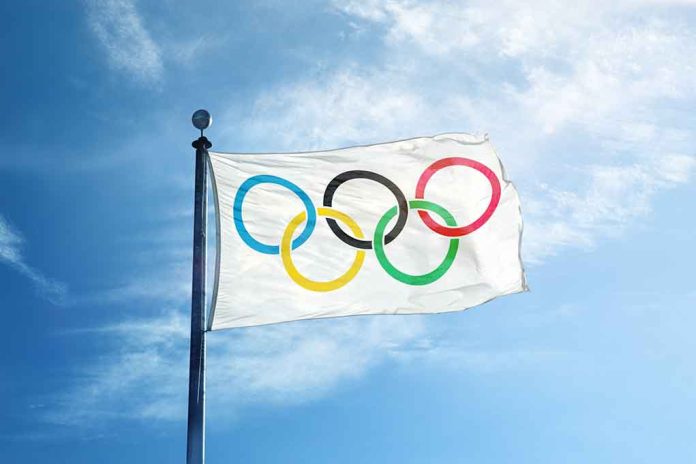
Russia faces a looming ban from the 2026 Winter Olympics, potentially denying NHL superstar Alex Ovechkin his final opportunity to fulfill his lifelong dream of winning Olympic gold and following in his mother’s footsteps.
Key Takeaways
- The International Olympic Committee has requested schedules from the IIHF that exclude Russian teams from the 2026 Winter Olympics in Italy
- NHL superstar Alex Ovechkin may lose his final chance to win an Olympic gold medal, a longstanding career goal
- France will replace Russia in both men’s and women’s ice hockey tournaments
- The ban extends the exclusion of Russian and Belarusian players from international hockey events since the 2022 invasion of Ukraine
- The Russian Ice Hockey Federation maintains no final decision has been made, with additional consultations planned for summer
Olympic Dreams Shattered for Russian Athletes
International Ice Hockey Federation (IIHF) President Luc Tardif has indicated that Russia will likely be barred from participating in ice hockey tournaments at the 2026 Winter Olympics in Italy. This revelation came during the IIHF Annual Congress in Stockholm, Sweden, where federation officials discussed the continuing sanctions against Russia in international sports. The decision, while not yet officially announced by the International Olympic Committee (IOC), appears imminent based on recent communications between the two sporting bodies.
“Recently they asked us to send them a schedule without Russia, so that’s where we are. The official statement is pending but the IOC has told us that they are informing the Russian Olympic Committee that they are not participating in the Olympics,” said Luc Tardif, IIHF President.
The IOC’s request for schedules excluding Russian teams strongly suggests that the ban will be formalized soon. The 2026 Winter Olympics in Italy will mark the first Olympic Games with NHL player participation since 2014, making the timing particularly significant for Russian NHL stars. The men’s tournament is scheduled for February 11-22, while the women’s competition will run from February 5-19. France has already been designated to replace Russia in both tournaments, further indicating that planning is proceeding under the assumption of Russia’s absence.
Ovechkin’s Olympic Dream Fades
For Washington Capitals star Alex Ovechkin, this ban represents more than just another international competition missed. At 40 years old by the time of the 2026 Games, this likely represents his final opportunity to capture the one accolade that has eluded him throughout his illustrious career: an Olympic gold medal. Ovechkin has participated in three previous Olympics without securing a medal, despite his tremendous success at other levels of international competition and his record-breaking NHL career.
“The Olympics are in my blood and everybody knows how much I love my country. My mom was a two-time Olympic champion, and when I start to play hockey, I dream that if I have a chance to play for my country, I will do it every time they ask me,” said Alex Ovechkin, Washington Capitals star.
The emotional weight of this potential ban is heightened by Ovechkin’s deep personal connection to the Olympics. His mother, Tatyana, won two Olympic gold medals as a basketball player, creating a legacy he has long hoped to match. Ovechkin has consistently prioritized representing his country, even serving as an ambassador for the 2014 Sochi Olympics and carrying the Olympic flame. The continuing ban effectively ends his chances of achieving Olympic glory during his playing career.
Ongoing Sanctions and Diplomatic Tensions
This potential Olympic exclusion continues the pattern of sanctions against Russian sports that began in 2022 following the invasion of Ukraine. Russian and Belarusian players have been banned from IIHF events since that time, and the extension of these sanctions to the Olympic stage represents a significant escalation in sports diplomacy measures. The IIHF has been clear that while they manage the competition itself, the ultimate decision regarding national participation rests with the IOC as the organizing body.
“The IOC is the organizer – we only deal with the competition (the hockey tournaments) itself. We have been pressuring them to make a decision, one way or another, because we’re getting closer to the Olympics and we need to know,” said Luc Tardif, IIHF President.
For their part, Russian sporting authorities have not conceded the matter. The Russian Ice Hockey Federation released a statement suggesting that the issue remains unresolved and subject to further discussion. “The issue of participation of Russian national teams in the 2026 Winter Olympic Games was raised at the Congress of the International Ice Hockey Federation. The IIHF, the ROC and the FHR will hold additional consultations on this issue in the summer. The final decision will be made later,” According to the Russian Ice Hockey Federation. This response highlights the diplomatic maneuvering still ongoing, even as practical preparations for the Games proceed without Russian inclusion.
The New Olympic Hockey Landscape
With Russia’s apparent exclusion, the Olympic ice hockey tournament groupings have already been reorganized. In the men’s tournament, Group A will feature Canada, Switzerland, Czechia, and France; Group B includes Finland, Sweden, Slovakia, and Italy; while Group C consists of the United States, Germany, Latvia, and Denmark. The women’s tournament will be divided into Group A with Canada, United States, Finland, Czechia, and Switzerland, and Group B comprising Germany, Sweden, Japan, Italy, and France. These groupings demonstrate how swiftly the international hockey community has moved to adjust to the new reality.
The Olympic ban represents yet another example of how international sports continue to be influenced by geopolitical conflicts, with Russian athletes paying the price for their government’s actions. For hockey fans worldwide, and particularly for admirers of players like Ovechkin, the 2026 Olympics will be marked not only by who participates but also by the notable absence of one of hockey’s traditional powerhouses and its stars who remain caught in the crossfire of international politics.




